- Home
- Mark Wayne McGinnis
Ship Wrecked: Stranded on an alien world
Ship Wrecked: Stranded on an alien world Read online
SHIP WRECKED
Trapped on an alien world
Mark Wayne McGinnis
Table of Contents
Prologue
Part I: The Visitor
Chapter 1
Chapter 2
Chapter 3
Chapter 4
Chapter 5
Chapter 6
Chapter 7
Chapter 8
Chapter 9
Chapter 10
Chapter 11
Chapter 12
Chapter 13
Chapter 14
Chapter 15
Chapter 16
Chapter 17
Chapter 18
Chapter 19
Chapter 20
Chapter 21
Chapter 22
Chapter 23
Chapter 24
Chapter 25
Chapter 26
Chapter 27
Chapter 28
Chapter 29
Chapter 30
Chapter 31
Part II: Dark Times
Chapter 32
Chapter 33
Chapter 34
Chapter 35
Chapter 36
Chapter 37
Chapter 38
Chapter 39
Chapter 40
Chapter 41
Part III: Hard Choices
Chapter 42
Chapter 43
Chapter 44
Chapter 45
Chapter 46
Chapter 47
Chapter 48
Chapter 49
Chapter 50
Chapter 51
Chapter 52
Chapter 53
Chapter 54
Chapter 55
Chapter 56
Acknowledgments
Other Books by MWM
Prologue
The creature, most commonly referred to as a Griar-Loth, or just Loth, listened to the surrounding ambient noises within the vessel. After nearly two hundred sleep cycles, the Loth was cognizant of even the minutest audible fluctuations. The spacecraft was comprised of numerous metallic composites, most of which not only conducted sound, but vibrations as well—such as those of someone walking, or tossing and turning in their bunk, or squatting down to relieve themselves. The Loth was keenly aware of the one surviving biped’s habitual locomotion throughout the ship, just as she was of the nineteen others—before she ate them.
The vessel is quiet. Where has my keeper gone?
For the thousandth time, the giant creature, with its six-octopus-like tentacles, began to thump, thump, thump, across the modified hold compartment. A prison cell, surrounded by forty-foot-tall, reinforced bulkheads, gave her just adequate space to stand upright and move about.
Her hind appendages folded beneath her as she abruptly sat down, fighting off an overwhelming hunger, and boredom—and loneliness. She slid the rest of the way down to the hard metal deck, resting her disproportionately large head on an extended forearm. A constant flow of yellow-white mucus, secreting from both corners of its mouth, pooled thick and viscous around its bottom jaw—a jaw easily the length of a Chevy Tahoe.
The Loth thought about life before her capture, on a planet where others of her kind flourished. Where the Griar-Loth was the dominant species. She didn’t understand why she and several others had been taken—had been abducted. She thought of the other two—both had been smaller than her. She had been forced to devour them. Unfortunate, but survival demanded it.
The overhead lights flickered off and on over and over again. It annoyed her. That and the periodic liquid jets—cleansing cycles—had ceased to flow. Now she was forced to lie down in her own dung and breathe the putrid air. Shredded remnants of crewmembers’ uniforms lay amongst bits and pieces of human skeletal remains. An empty boot stood upright not far from her wide snout.
It wasn’t the first time the Loth considered her unfortunate circumstances. She badly wanted to return home.
Startled, she heard the sound of metal scraping against metal—the sound of a latch mechanism being released. The Loth stared at the oversized gate, waiting for the keeper to enter. Perhaps point his weapon at her—make demands. But no one entered. The Griar-Loth rose to her feet and, with some trepidation, slowly moved toward the gate. Standing before it, she waited and listened but heard no sounds of biped movements—no breathing, no anything. She nudged the big metal door with her extended jaw—watched it swing wide open on its hinges. She continued to stare out with fascination. Where is my keeper? Why is the vessel so quiet? The Loth moved toward the open gateway then hesitated, gazing backwards toward the far back corner of the hold where the moist pod lay protected—nestled within the clothing fabric of four devoured crewmembers. Sadness fell over her. Best I leave here … before I am forced to do the unthinkable. She was so hungry.
PART I
The Visitor
Chapter 1
Just a guy sitting at the counter. Late thirties, maybe, sitting on a stool, and eating alone. Hunched over, content to eat his bacon and eggs in peace. His wool watch cap was pulled down low over his head, the collar on his faded-green army jacket turned up, obscuring uncommon features. No one seemed even remotely interested in him. Good. He looked in the wall mirror, affixed directly across from the counter, and brought the cup to his lips the same as others near him were doing. He sipped at the tepid brown liquid and fought the urge to make a face. Humans willingly drink this swill?
“Top that off, hon?”
The alien’s eyes locked onto the young, copper-headed, human female holding a metallic-looking canister in one hand. He hadn’t seen her approach. Am I that tired?
Smiling, the plump server raised the canister up a tad higher. “Coffee?”
He knew enough of their language to understand her words. But speaking the language was another matter, although he’d diligently practiced it back at the nearby domicile. He shook his head and she scurried off. His eyes returned to the mirror. Had she noticed my ears? He didn’t think so.
A withered old male, sitting next to him at the counter, stood and withdrew something made from the hide of an animal. He plucked out three printed bills; the alien knew it was money, knew how things were paid for in this world. He noted the denominations—a five and two ones. Seven dollars. The alien had, if he’d calculated things correctly, two hundred and ten dollars in his pants pocket. Money he’d pilfered from the domicile up on the mountain. A domicile he’d watched from a distance off and on for three cycles before determining the place was uninhabited. That was forty-three cycles ago. He reformulated that figure into how humans would batch those cycles together—what they called days, weeks, and months—and determined he’d been there almost a month and two weeks. Although he primarily lived in his spaceship, of late he’d been spending more and more time in the domicile. No … what do they call it? A house. Considering his vessel was currently devoid of the necessary power to operate any key functions—the propulsion, environmental, and communications systems—it was no longer an adequate habitat. Not with the intolerably cold temperatures existing outside. Still, there were some moderately pleasurable aspects to this foreign place. He enjoyed driving the vehicle, one he found stowed away in the home’s storage facility. The garage, he corrected himself. Something called a Bronco. It seemed to the alien that most everyone around there had a Bronco. It was how they traversed the landscape, no matter how short a distance they needed to navigate. Humans were averse to walking, it seemed. He’d driven the Bronco here, his second excursion out among the human population. He reconciled himself with the fact that he would be around for some time—perhaps several months. Best he
try to blend in. Acclimate. His thoughts returned to his ship. Although partially hidden, he knew leaving it for an extended period of time was unwise. Not with what was secured in the hold. If it were to escape, ugh, he didn’t want to think about the repercussions from such a dire proposition. His thoughts then turned to his crew, now dead, and he suddenly found it difficult to swallow.
Chapter 2
Driving, Cameron Decker half-listened to the radio—a 24/7 news station. They were discussing the differences between Millennials and Generation Z. On the cusp between both groups, at age twenty, he briefly considered which he most identified with. Maybe neither. But then again, nothing about his life had been typical up to now. He briefly thought about his parents—what he remembered about them prior to their deaths, when he was five. Old photographs were not the same as actual memories. Then he thought about the gruesome murder he’d witnessed back in that seedy little border town in Texas, when he was eight-and-a-half. Both were life-altering incidents. And maybe, just possibly, they’d callused his emotional psyche. He’d been told as much by others. So what? Be it Generation Z or Millennial, his life’s trajectory within those confines continued to be … well … unique—more than a little complicated.
He slowed before pulling off Horton and turning onto the parallel-running side street still needing to be plowed. The wiper blades on his twenty-year-old F150 barely kept up, sloppily swiping to clear fresh falling snow from the windshield. Scanning the adjacent lot, he spotted a place to park not too far from the entrance. The Drake Café—erected over one hundred years earlier—was built from strong, local, eastern white pine, which had, over time, aged in color to a rich ebony patina—characteristic of many of the homes and businesses in this small New York town. Cameron turned off the ignition, then waited while the Ford engine continued to churn and rumble for several long moments. The noise finally letup with what sounded like a last desperate gasp. He was quickly losing affection for the old heap. Exhaling a hot breath into his cupped, frigid fingers, Cameron leaned against the stubborn driver’s side door. Its screeching, angry-sounding hinges, were but another reminder it was time to kick the old dog to the curb. He checked his appearance in the rearview mirror. His dark-brown mop of thick unruly hair always seemed to look as if he’d just awoken, and today was no exception. Cameron scanned his face for any recent zit arrivals, or if something uninvited protruded from his nose. He did manage to brush his teeth before running out this morning; otherwise, he’d paid little attention to his appearance. Overall though, he figured he didn’t look too terrible. A late bloomer, he’d youthfully suffered the double whammy of requiring both braces and glasses. Yet the geeky smart kid—all through grade school and high school—had somehow been transformed from the proverbial ugly caterpillar into the not-so-bad-looking butterfly. Braces now off, as were the glasses—thanks to contacts and then, later, to Lasik. His skin, too, had cleared up nicely. A daily morning routine of two hundred pushups, plus two hundred sit-ups, changed former adolescent scrawniness into a more athletically toned fitness. His first few years away at college brought him enough attention from the opposite sex to almost feel good about himself. Almost.
Now, hurrying to outrace the morning chill, he glanced in through the café’s front window and noticed the place was nearly packed. Stomping snow from his boots, he pulled open the sturdy front door and was immediately engulfed in the eatery’s welcoming warmth. He inhaled the intoxicating aroma of hot flapjacks, maple syrup, and bacon, sizzling on the back grill, and coffee. Wonderful, enticing, coffee.
“Hi Cam …”
The hostess had long, straw-colored hair and robin’s-egg blue eyes that matched the color of her crisp-looking, button-down shirt. Glancing past his shoulder, she’d be able to see his truck, parked five or six cars down from the entrance. She glanced back at him with a bemused expression.
A part of him supposed she was the reason he was there now, although the relationship was over. Inevitable. Seeing her again, before he headed west, was only prolonging things. “Hey, Heather. Yeah, it just needs to get me back to school … one more time … then I’ll—”
“Hey, it’s your truck. What do I care?” She grabbed the top menu off the stack, along with bunched-together silverware wrapped in a paper napkin. “Got a table near the window … How’s that?”
“Good. Thanks.” He watched her; she didn’t simply walk—she glided. Her athletic lithe form was captivating, impossible not to notice. She had a natural beauty … the way her skin radiated something akin to pure sunshine—even now, in the midst of an early snowstorm in October. Although they were the same age, twenty, she’d been a grade behind him back in high school. He’d skipped eighth grade—never achieving less than a perfect 4.0 GPA. Even back then, he was bored academically. For some unfathomable reason, she’d first shown an interest in him when she was a sophomore and he a junior. She played the violin and was popular. Him, not all that popular. His biggest claim to fame was math club president. That, and eventually only one of only three seniors to be awarded a full-ride scholarship, to an outstanding university—in his case, Stanford. Except for a full page written by Heather, he’d left high school with a yearbook void of inscribed best wishes except for a handful, quickly scrawled, impersonal one liners. He was okay being a loner. Preferred it that way.
Heather, though smart, actually extremely smart, had zero interest in going off to college. She preferred the simple life—remaining in Larksburg, keeping close to her family. Maybe even raise a family there, in the not too distant future. Cameron, on the other hand, had a nearly uncontrollable urge to challenge himself—further learn, explore, experience. Perhaps it was due to his not-so-typical upbringing. He didn’t recall much about his real parents, the details pretty sketchy. They were apparently killed in a car accident, on an interstate somewhere in Texas, when he was five. All he had that was left from them were a matching stack of well-worn and dog-eared books. He had found solace reading a nearly complete set of hardbound volumes of The World Book Encyclopedias. The set was only missing the XYZ volume. Even to this day, any subject matter starting with the letters X, Y, or Z was less familiar to him. But after reading the other volumes, A through W, no less than one hundred times—from beginning to end over the ensuing years—he was well versed in just about every subject. That is, well versed in what was known in the year 2001, when the set of books was published.
After a stint of living with a villainous uncle, one ill prepared to care for a little kid, he was thrown into the foster care system. Though never abused physically—assaulted or beaten—the things he’d witnessed as a child left an impression. Had changed his life. Made him leery of others … until he met Heather. Their relationship presented him with a new set of problems from the beginning. He was unable to voice the kinds of things she wanted to hear, needed to hear. He didn’t know the tried-and-true rules to follow for a relationship to truly thrive. Didn’t realize love required so much attention. Seeing her now, watching heads instinctively turn just to catch a glimpse of the lovely young woman, he forced himself not to think about what was. He had a plan. One that didn’t include spending his most productive years in bum-fuck Larksburg Stand.
Cameron plopped into the booth and watched as Heather set down the silverware and placed the menu before him. “I’ll be right back with some coffee … Give me a sec, Cam.”
Her sweet fragrance lingered behind her as she hurried off to greet an elderly couple now entering the cafe, along with an incoming billowing gust of snow flurries. Heather knew them by name, but then she knew just about everybody in town. His internal dialogued continued: What were you supposed to do? Remain in Larksburg Stand for the rest of your life and ignore the full-ride scholarship offered in California? Miss out on Northern Cal’s lack of snow, the ocean, and those endless beaches? But mostly, it was his now going on three-years internship at HyperCrell, which was pretty much unheard of by those not directly involved in today’s cutting-edge high-technology. HyperCrell was o
ne of the most innovative San Jose companies in the country—perhaps the world. It wasn’t uncommon to see top execs from Apple, Google, Amazon, and others, roaming the halls, always accompanied by a HyperCrell employee, or intern, such as himself. He was there because of his excellent grades and what had been deemed an insatiable thirst—not only for knowledge but an insatiable drive for a better understanding of how things worked. And thanks, too, to a bit of old-fashioned good luck, Cameron was snatched up during his freshman year at Stanford and offered a rare internship into that well-funded, boutique organization. Also, a full-time job there, awaiting him post graduation. A position that came with all the perks—exorbitant salary, interesting work, and, of course, all that summer sunshine. But there was one thing HyperCrell didn’t include—Heather. She was why he kept coming back at various school breaks. He knew it was over, but he simply couldn’t help himself.
Heather, back now, was turning over his upended coffee cup. Several strands of hair, toppling free from behind her ear, tickled his wrist. She poured, not moving away, her every action, gesture, speaking loudly to him—conscious reminders: do you see what you’re missing. What you’ve lost, jack ass?
“I can take your order, if you know what you want. Ginger’s pretty backed up right now.”
“The usual … I guess.”
“Spose you have everything packed-up in there?”
He followed her gaze out the window and toward his truck. Even from this distance away, it was evident that both the passenger side of the cab and the bed of the truck were piled high with a variety of stuff.
“Is that a surfboard?”
“Used. Got it cheap on eBay.”
“And you’re taking your bike to school? Decided not to come back spring break?”
Cameron could see his bike’s rear wheel was only partially covered by the tarp. Hitching up one shoulder, he replied, “I don’t know … I have a job …”
“You mean an internship,” she shot back. Not waiting for a response, she was gone. Refilling coffee cups on other tables situated along the window.

 The Hidden Ship
The Hidden Ship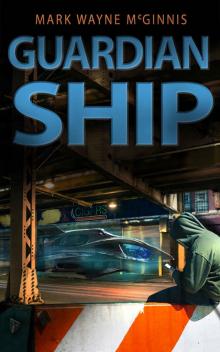 Guardian Ship
Guardian Ship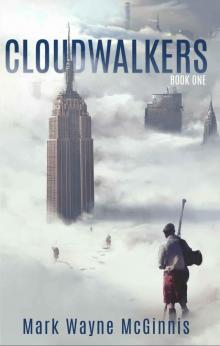 Cloudwalkers
Cloudwalkers Mad Powers (Tapped In)
Mad Powers (Tapped In) Ship Wrecked
Ship Wrecked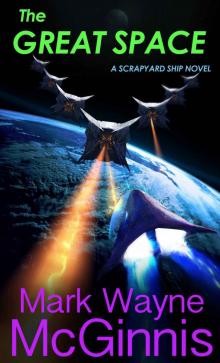 The Great Space (Scrapyard Ship Book 6)
The Great Space (Scrapyard Ship Book 6)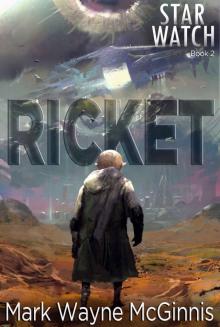 Ricket (Star Watch Book 2)
Ricket (Star Watch Book 2)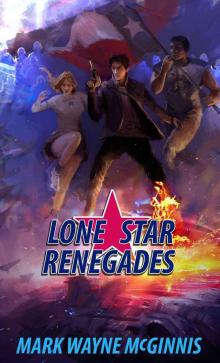 Lone Star Renegades
Lone Star Renegades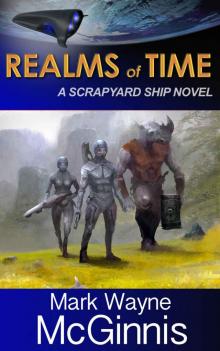 Realms of Time (Scrapyard Ship)
Realms of Time (Scrapyard Ship) Glory for Sea and Space (Star Watch Book 4)
Glory for Sea and Space (Star Watch Book 4) Scrapyard Ship 3 Space Vengeance
Scrapyard Ship 3 Space Vengeance Boy Gone
Boy Gone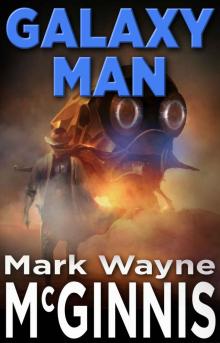 Galaxy Man
Galaxy Man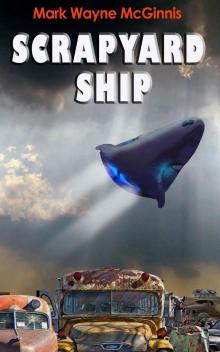 Scrapyard Ship
Scrapyard Ship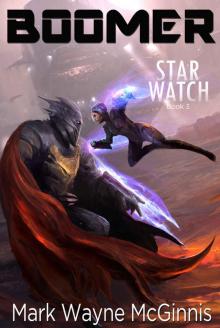 Boomer (Star Watch Book 3)
Boomer (Star Watch Book 3)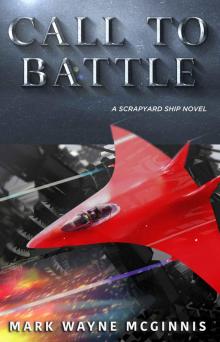 Scrapyard Ship 7: Call to Battle
Scrapyard Ship 7: Call to Battle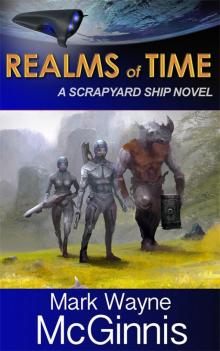 Scrapyard Ship 4 Realms of Time
Scrapyard Ship 4 Realms of Time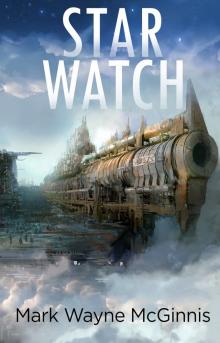 Star Watch
Star Watch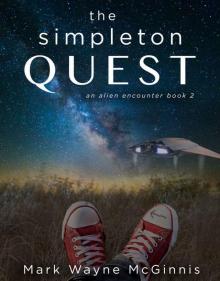 The Simpleton QUEST
The Simpleton QUEST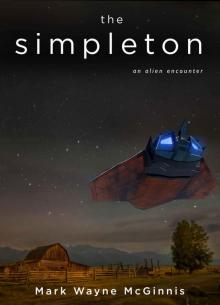 The Simpleton: An Alien Encounter
The Simpleton: An Alien Encounter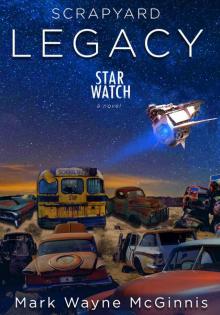 Scrapyard LEGACY (Star Watch Book 6)
Scrapyard LEGACY (Star Watch Book 6) Ship Wrecked: Stranded on an alien world
Ship Wrecked: Stranded on an alien world